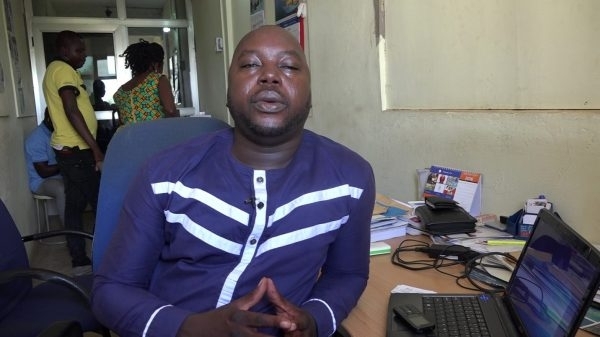Benchmark Value: GRA Board Chair pushing AGI agenda – Awingobit
 Sampson Asaki Awingobit
Sampson Asaki Awingobit
The Importers and Exporters Association of Ghana (IEAG) has accused the Board Chairman of the Ghana Revenue Authority (GRA) of doing the unbridled bidding of the Association of Ghana Industries (AGI), the umbrella body of local manufacturers, instead of the vast majority of Ghanaians as far as the reversal of the 50 per cent benchmark value discounts on some selected items at the ports is concerned.
According to IEAG, the AGI is an association that Mr Tony Oteng Gyasi once chaired and now using his position as the GRA Board Chair to have things skewed in favour of the AGI.
IEAG is of the view that despite the unpopularity of the reversal decision, the AGI, motivated by the GRA Board Chair, is bent on seeing the policy through.
Mr Sampson Asaki Awingobit, the Executive Secretary of IEAG, said that is why the AGI continues to engage the GRA with its advocacy for the reversal of the discount policy.
Mr Awingobit made this allegation on Accra100.5FM’s morning show Ghana Yensom hosted by Kwame Obeng Sarkodie on Accra 100.5 FM on Tuesday, 11 January 2022.
He said the GRA Board Chair has found himself in a conflict-of-interest situation by secretly pushing the interest of the association he once led, instead of pushing for the interest of the vast majority of Ghanaians.
“It is through the assistance of the GRA Board Chairman that the leadership of AGI, led by Dr Humphrey Ayim-Darke, managed to go and do a secret presentation on the reversal of the benchmark values and how the benchmark policy implementation is affecting their survival as local manufacturers to the Economic Management Team (EMT) on the blindside of other stakeholders such as the Ghana Union Traders Association (GUTA), Pharmaceutical Importers, Exporters, and Wholesalers Association of Ghana among others,” Mr Awingobit alleged.
Meanwhile, President Nana Addo Dankwa Akufo-Addo has directed the Ministry of Finance, through the GRA, to suspend the decision to reverse the benchmark value discounts to allow broader consultations to take place.
AGI recently said “investor confidence is waning, and no investor would like to invest in a real sector that is currently exposed to the influx of imports as we have” and has, thus, urged the government to remain focused in its quest to reverse the benchmark value discounts at the ports.
The GRA, for the second time, delayed its implementation of the benchmark value discount reversal.
It now intends to roll it out on Monday, 17 January 2022.
The GRA explained in a statement that the second delay is aimed at ensuring a smooth take-off following several complaints received from importers and exporters in the country when the implementation started on 4 January, which forced the first delay to 6 January.
Additionally, the second delay is to allow a storage-free period for vessels discharged on 31st December 2021 to go through clearance without being affected by the reversal of the policy.
A statement from the GRA said effective Monday, 17 January 2022, any Bill of Entry (BOE) presented without payment of duty and other taxes or deposit of security (where it is a suspense cargo) will be affected by the policy.
A bill of entry, the GRA said, shall require reprocessing to be affected by the new policy.
This will include the following:
Where BOE tax assessment is accepted by declarant but tax bill has not been paid
Where BOE tax assessment is yet to be accepted by the declarant
Also, the GRA said for any assessed BOE that was affected by the earlier effective dates of 4th or 6th January 2022, a reprocessing will be required to reverse the effect of the policy on duty and taxes.
However, a statement from the AGI signed by its President, Dr Humphrey Ayim-Darke, said: “Industrialisation is so central to Ghana’s economic liberation that we cannot afford to sacrifice our industrial initiatives for such short-term gains that serve the interest of few importers”.
This policy, in the AGI’s view, “is very regressive and will be most unfortunate if maintained in its current form”.
“We wish to emphasise that it is the sustainable jobs that will give economic empowerment and generate domestic revenue”, the AGI added.
Read the full AGI statement below:
PRESS STATEMENT AGI URGES GOVERNMENT NOT TO BACKTRACK WITH IMPLEMENTATION OF REVERSAL OF BENCHMARK DISCOUNT VALUES
The Association of Ghana Industries (AGI) is urging the government to remain focused on its Industrial Transformation Agenda and unwavering in its decision to implement the reversal of the benchmark discount policy.
While a number of countries offer export rebates to their firms to develop export trade, Ghana’s benchmark discount policy offers a universal import rebate that only promotes importation and this policy distorts our micro- and macro-economic fundamentals.
Indeed, nothing explains the creation of sustainable jobs and economic emancipation better than the right industrial policy decisions and that deliberate effort to industrialise.
Guided by the overarching framework of Ghana’s industrial transformation agenda, 1D1F initiatives, Planting for Food and Jobs, fertiliser subsidy and Ghana’s export development agenda, the AGI believes the benchmark discount policy, in its current form, runs counter to the government’s own agenda to industrialise.
To mention a few, we have seen the government commission the Savelugu rice factory in August and Sefwi Akontombra rice factory in September just last year.
These two recent investments totalling about GHS14 million risk becoming redundant if such large rice imports persist.
Investor confidence is waning, and no investor would like to invest in a real sector that is currently exposed to the influx of imports as we have. Industrialisation is so central to Ghana’s economic liberation that, we cannot afford to sacrifice our industrial initiatives for such short-term gains that serve the interest of a few importers.
This policy is very regressive and will be most unfortunate if maintained in its current form. We wish to emphasise that it is the sustainable jobs that will give economic empowerment and generate domestic revenue.
The exigencies of local manufacturing became more prominent with the outbreak of the covid-19 pandemic. With the disruption of global supply chains, high cost of raw materials and freight during the pandemic, we all saw the need to quickly scale up the development of our local supply chains.
Today, we are all complaining of the rising cost of freight. But the more dependent we are on imports, the more likely we are to bear the brunt of such high freight costs and the reverse holds true. AGI supports economic cooperation and multilateral trade, the reason why Ghana has signed a number of trade agreements.
But we also note that signing of trade agreements such as AfCFTA and the interim Economic Partnership Agreement (iEPA), alone will not guarantee the gains we desire. These will only be meaningful if we build local production capacity to create jobs and export.
AGI supports the application of the policy to selected items of national priority only. It is important for Government to cushion local products for which there is local production capacity.
Secondly, we urge the government to maintain the benchmark policy for manufacturers to help grow the real economy.
Manufacturers are finding it difficult to retain their employees, with such an influx of imports at cheap prices displacing their products on the market.
The benchmark discount policy, in its current form, could worsen the unemployment situation. The future of our country and our youth should guide us in our quest to promote policies that spur economic growth, industrialisation and sustainable job creation.
We welcome stakeholder dialogue on the benchmark discount within the context of what is best for our country. We do understand why some of our importers and traders are unable to broach the topic of industrialisation. Indeed, industrialisation is a difficult path in doing business.
It may sound long-term and possibly deprive some businesses of short-term gains. But we all need to make sacrifices for our country to develop and that is the reality.
Our sacrifices will eventually pay off. We seize this opportunity to make a clarion call on all well-meaning persons and groups including the TUC, ICU, GNCCI, and GUTA to support this worthy cause of the reversal of this benchmark discount policy in our national interest.
We urge Government to continue creating that favourable policy framework for Industry to thrive and create prosperity.
Signed: Dr. Humphrey Ayim-Darke
AGI President
For and on behalf of Association of Ghana Industries
If you need further information, please call 0302 251266 Website: www.agighana.org January 10, 2022
Source: Classfmonline.com/Cecil Mensah
Trending News

Feeding grants'll be paid directly to school heads in my next gov’t – Mahama promises
11:02
Francis-Xavier Sosu rallies support to aid Madina market fire victims
19:30
NPP sets up disability secretariat
02:46
NDC Youth Wing expresses solidarity with nurses and midwives
10:08
Running mate: Ashanti NPP youth organisers distance themselves from Napo’s bid
10:11
Asantehene commends Matthew Opoku Prempeh for conceiving GENSER Kumasi Pipeline Project
01:37
I'll ban all mining in water bodies, forest reserves – Kyerematen
12:04
2024 polls: 'Bawumia in pole position to take over from me' – Akufo-Addo
03:45
Struggle for next NDC leader'll make Mahama gov't lose focus if he wins 2024 polls - Afenyo-Markin says Bawumia 'better' option
14:16
I will form a truly representative government -Alan kyerematen
18:03



